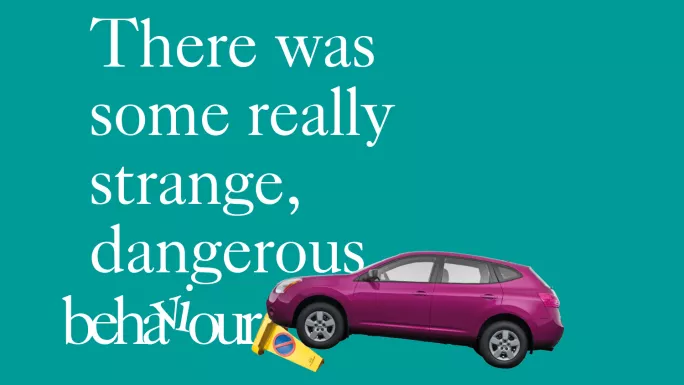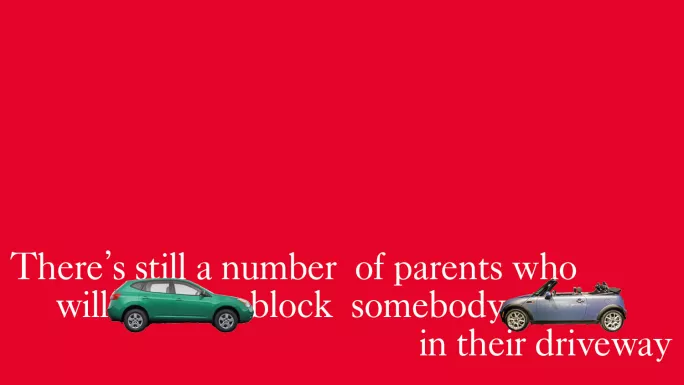Spaces: the final frontier

Let’s be clear: it is a war. An unconventional one, with three opposing sides rather than two, but a war all the same, with casualties, battles, truths and untruths.
Schools, parents and local communities don’t want to face off, they want to be in harmony - all the evidence says that is crucial to children achieving in education. But the school run - the contentious ground of this dispute - seemingly brings out the worst in everyone.
Steve Moore, director of neighbourhoods at Havering London Borough Council, was concerned enough to formally observe it.
“We monitored the behaviours and found that normally very decent people, for that 15-minute window in the morning, had a sort of Jekyll and Hyde thing - blocking people’s drives, driving onto people’s drives, you know, mounting the pavements,” he says. “There was some really strange, dangerous behaviour.”

It’s a recurrent national issue. Google reveals the following headlines: “Bowls club and mayoress clash over school parking”; “Man sits in car on drive to stop school run parents parking outside his home”; “Police patrol roads near school”; “Parents to receive penalties for selfish parking”; “Car parking chaos at school”; “‘War’ over parking”; “Spy car to snoop on poor school parking”; “Fire engine struggles to get through streets near schools”.
Those are all from one week - and that’s not even all of them.
It’s not simply locals being precious, complaining to schools, those schools being heavy-handed and then parents ignoring them or being stubborn. These aren’t harmless squabbles. This is serious.
Moore would get emails saying, “‘If you don’t do something soon, a child’s going to get killed.’”
So what, as a headteacher embroiled in a school-run war, can you do about it all?
Chaos at the gates
While no one may accept the blame for it, everyone knows the school run is a problem.
In research commissioned by the charity Living Streets, which promotes children walking to school, more than half of parents said chaos at the school gates was their biggest worry about the school run, and 20 per cent had experienced aggression from other parents or local residents.
“We work in schools all over country, and we know from talking to teachers, students and parents that they find the school-run experience around the school gates really unpleasant,” says Steve Chambers, the charity’s policy and research coordinator.
Frenetic, chaotic, frightening even - it’s the kind of atmosphere you don’t want to the children to absorb every morning. It’s also a poor example of social behaviour that children can mimic, learning that the approach to confrontation is to escalate and yell and swear. Meanwhile, it’s poisoning the relationships between schools, the local community and particularly parents, who need to be onside. How much are you going to achieve as a school in an atmosphere of distrust and aggression?
Inevitably, all this lands on the headteacher’s doorstep.
“The issue of parking can be a real headache for headteachers,” says James Bowen, a former headteacher who’s now director of the NAHT Edge middle leaders’ union. “It can feel like a distraction from what you want to be focusing your time on.”
It also requires a degree of diplomacy the UN would covet.
You are stood by the side of the road, trying to balance the demands of parents you need on side, local residents you need to keep happy and the laws of the land on basic social decorum. And all blame is on you for this, whatever you say. Can’t you sort this out? Well, probably not.
“You can remind parents to park in a responsible way, but, frankly, you can’t do an awful lot more than that,” says Mr Bowen.
But if a head does not act, then the council will. Moore and Havering council pondered parking enforcement laws. But it turned out that they didn’t have much authority to act.
“We were quite weak with what we could do,” admits Moore. “There were changes in the legislation about a year before from the government, which weakened local authorities’ abilities to enforce on yellow lines and those sort of things. We were really struggling to come up with a solution.”
But inspiration struck.
“Then we looked at it from a different angle: ‘Well, if we can’t use civil law, if we can’t use penalties for parking as an offence, maybe we need to look at criminal law’,” he explains.
“We looked into whether a public space protection order [part of the Anti-Social Behaviour, Crime and Policing Act 2014] could be used to make it an offence to drop off your children within a defined zone, because the pinch point was really that sort of 100-metre area outside the school gates.”
They looked into it, decided it could be used, then tried it out.
Four pilot schools all adopted the scheme voluntarily - one in Hornchurch, one in Rainham, and two in Cranham - and the zones were implemented a year ago. Parents who dropped children off within the zone would be fined. Repeat offenders could be taken to court and end up with a criminal record.
“It’s been massively successful,” says Moore.
And yet, the threat of criminalising parents is arguably not the greatest way to encourage good relations between parents and schools - headteachers would presumably rather act to stop the chaos themselves before such measures were taken. So is there a less...punitive option?
“Often the solution is, ‘How can we get children and parents out of their cars?’” says Mr Bowen.
Beating the rush
Living Streets, which was originally formed in 1929 as The Pedestrians’ Association - it campaigned for pedestrian crossings, driving tests and speed limits - has been trying to do just that.
The charity runs campaigns such as the Walk to School Challenge and promotes lower speed limits and more crossings to reverse the decline in children walking to school - 70 percent walked a generation ago, but now only 53 per cent of children aged 5-10 walk, according to Living Streets.
But as Simon Williams of the RAC explains, there are some good reasons for driving: “Parents are on their way to work. They’re trying to drop children at school and coincide the two.”

In the rush of the morning, getting to school quickly and then dashing to work often means that walking is too slow. Also, some don’t live near enough to the school to make walking viable.
So, while some concentrate on promoting walking, others are innovating ways of reducing pressures in the immediate vicinity of the school.
At first glance, you wouldn’t think St John the Baptist Church of England Primary School in Hampshire would have parking problems. It’s in a village called Waltham Chase, bordered on two sides by fields, with a car park (for staff only) and road to its south called Solomons Lane.
That road is a problem - it’s the main parking area for parents, and it’s not ideal.
There are some spaces on the road, but there are so many cars at peak times that some parents park wherever they can, including on zig-zag lines, meaning children have been at risk.
To alleviate the problem, some parents started parking at a nearby pub and walking from there - park and stride. Others parked at the village hall so that children could walk along a track.
But the problem remained and headteacher Kay Bowen was concerned when parents made comments to her such as, “‘It was really crazy this morning.’”
So they’ve been creative. One of the parents arranged a “day of action” in June for some of the children to write letters and give presentations about parking to parents and local councillors. That prompted other parents to get involved. One parent wrote to the council to arrange for signs to be erected at the school entrance, so that zig-zag lines would be enforceable. Another parent provided high-vis jackets for children to go outside and hand leaflets to parents, reminding them of what’s expected.
“It just feels so nice that the parents are doing it and it’s not becoming a battle,” says Ms Bowen, who wanted to avoid the division that often arises in parking confrontations. “At my old school, we did get a long way,” she says, “but it was much more about the residents ringing up the school all the time and us having to constantly remind parents, ‘Please don’t park here, please don’t park here.’ This feels much more organic.”
The school has also made stronger ties with the local police community support officer. Ms Bowen says she wants to avoid the teaching staff taking responsibility for parking, hence she doesn’t tell parents off at the gate.
“I personally try not to because I feel that we’re all adults and we all need to work together to solve the problem rather than it being a policing role for us as a school.”
She adds: “I don’t think that’s our job.”
Many schools have been employing similar techniques. A story in the Swindon Advertiser in 2013 said that a local school had been suffering “parking woes” and the school was working with residents, parents and the council to create solutions such as a “walking bus” and “no waiting” markings.
Contacted to see how it all worked out, the school declined to talk because “things aren’t too bad at present”. Good news.
But the councillor mentioned in the original story, Dale Heenan, says there is still work to be done with regards parking at schools.
“I’ve been a councillor for about 14 years now,” he says, “and ever since I can remember there were always issues one way or another to do with parking outside schools in my particular area.”
He says the school had tried many things and the problem was alleviated “to an extent”, with fewer complaints and less traffic than there had been, but adds that “the problem hasn’t gone away”.
In fact, he says that the committee he chairs had recently approved investigations into public space protection orders.
“There’s still a number of parents who will block somebody in their driveway while waiting for school to finish and the children to come out or they’re dropping them off in the morning - that’s why we’re now looking at them,” he says.
“We’ve tried to play nice and do all these various things for a number of years. Have we now reached the point of where we look at the lessons of, say, Havering?”
Another school put under the spotlight by a local councillor and local press is St Thomas More’s Catholic Primary School in Bedhampton, near Portsmouth, which featured in a local newspaper story in June which was headlined “Fury as parking woes continue near school”.
‘It used to be a lot worse’
The school’s headteacher, Colin Flanagan, explains: “We have got a problem. The school has always had a problem. Prior to my appointment six years ago we had a problem. I’ve been dealing with it for six years and it is getting better.”
The issue is familiar: parents parking in ways that annoy locals and that may be unsafe for pedestrians.
Flanagan says that he goes out to monitor things and he and his staff have been sworn at, “but it’s only a minority of people”.
He says he has a list of initiatives that are alleviating the problem and they have had a “really positive effect”.
If the problem is familiar, so are the countermeasures: a team of children in high-vis jackets who educate peers and parents, leaflets, green cones, “no parking” areas and a local pub car park for “park and stride”.
“It used to be a lot worse,” says Flanagan.
But local councillor Ken Smith says that residents still complain to him about parking by parents - complaints that he’s been hearing consistently for the 13 years he’s been a councillor.
“These little things don’t sound awfully important,” he says, “but they build up over a period.
“There had been some sort of thought going around of putting rather draconian fines on parents who do it,” he says. “I read in the paper about one council which is going to fine the parents a huge amount money if they do what we’re talking about. I’m not sure if we can do that or not, to be honest with you.”
He says he will bring it up, though.
The council that caught his attention in the newspaper? Havering.
So is it inevitable that the only solution to the worst school parking woes is this one?
The Havering system is simple, but it has one big problem. To explain it simply, cameras monitor the streets at the four schools that are part of the pilot scheme.
Cars are not banned from driving along or parking in those streets, which would have required a permit system for residents. Rather, it’s an offence to drop off or pick up children during set times. The camera records footage, software spots offences and a person checks it all.
Park that argument
The fixed penalty notice is £100 and there is no right of appeal to the council. If the allegation is challenged, the case will be heard by magistrates and a court date sent by summons. But if the amount is paid within 14 days there will be no prosecution. If you do not pay the fine, or if you offend persistently, according to the council’s website you “may be prosecuted and face a fine of up to £1,000 and a criminal record”.
“When we first started consulting with the headteachers, they were so frustrated by the behaviour,” says Moore, who oversees the scheme for the council. “It was amazing. They said they sent letters home to the parents, they had teachers standing outside the gates in the morning, they’re sworn at by some of those parents.
“We also found that we were giving parking tickets to the same cars all the time. Some people, for some strange reason, were probably quite happy to take the £40 fine every now and again so long as they could drop their kids off straight outside the gate. So that wasn’t working. It was not changing the behaviour. We had to do something different. So we really emphasised that this is criminal law and you can end up with a criminal record.”
It was a big stick, so the council was cautious in its approach.
“For the first two or three weeks, for any non-compliance, rather than giving people a fixed penalty notice, we gave them a warning letter,” explains Moore. “We said, ‘Look, we have seen you in the zone, we’ve seen you do this, we haven’t fined you this time, but don’t do it again.’ That really worked well. People thought that was very fair and I think that was a pretty good approach. Once the three weeks was finished, the compliance was near enough 100 per cent.”
Which is, paradoxically, the big problem - it doesn’t raise money, yet the cameras and enforcement cost money.
“We’re talking about how you make this financially sustainable going forward,” says Moore. “Is this something the council sees as an investment in safety? Or is this something the schools see as an investment in their own children? Maybe it’s something that they’d like to contribute to? So we’re walking through that at the moment.”
As bad as the parking problem may be, school contributions to parking systems are unlikely. With current budget pressures, many schools simply do not have the cash to contribute. And if even if they were able to contribute, the finger of blame would then be pointed toward the headteacher, not the council - not the best PR move. Heads would rather avoid such punitive measures altogether.
And yet, Moore is unconvinced that any other approach but the stick will work.
“All the hearts and minds stuff has been done,” he says. “Until you say to someone, ‘If you continue to behave like that we are going to prosecute you,’ that’s what made the difference.”
It seems if you really want to end the parking war, badly behaved parents need to get their final warning.
Andrew Hankinson is a freelance journalist
You need a Tes subscription to read this article
Subscribe now to read this article and get other subscriber-only content:
- Unlimited access to all Tes magazine content
- Exclusive subscriber-only stories
- Award-winning email newsletters
Already a subscriber? Log in
You need a subscription to read this article
Subscribe now to read this article and get other subscriber-only content, including:
- Unlimited access to all Tes magazine content
- Exclusive subscriber-only stories
- Award-winning email newsletters